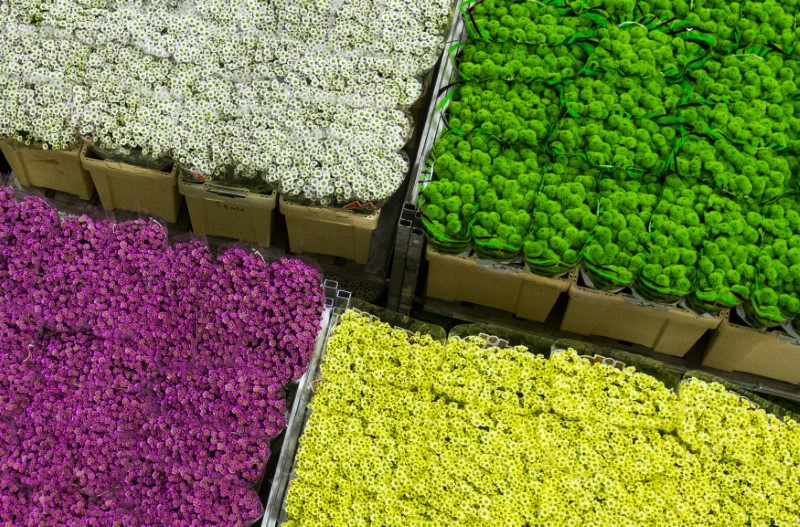By Thomas Escritt
AALSMEER, Netherlands (Reuters) – The Netherlands is fighting to retain its crown as the world’s top auction house for flowers as growers in Africa and elsewhere increasingly sell directly to buyers.
The country grew wealthy selling tulip bulbs in the 17th century during the so-called Dutch Golden Age and remains the second largest agricultural exporter behind the United States.
For decades the FloraHolland cooperative has acted as the hub from which planeloads of flowers from around the world are distributed from vast, air-conditioned warehouses in Aalsmeer, near Amsterdam airport.
The company says it distributes almost 50 percent of all flowers sold worldwide and last year it reported sales of 4.6 billion euros ($5.13 billion), mostly from matching growers and buyers at its famous early-morning daily auctions.
But worryingly for FloraHolland Chief Executive Lucas Vos,
sales of flowers by growers directly to buyers have overtaken those sold through FloraHolland’s auctions.
Direct sales from members of the cooperative bypassing the auctions rose by 3.8 percent to 2.3 billion euros last year.
Auction sales stood at 2.1 billion euros, down 1 percent.
“We need to realize that if, for instance, we want to get flowers into China or India …the logistical system we have built for ourselves probably does not fit,” said Vos, who was brought in from shipping firm Maersk in 2014.
In response, FloraHolland is looking to make changes to an auction system that dates back more than 100 years.
It is investing up to 90 million euros over the next five year and plans to develop a 24-hour online dealing platform.
It will be like “a Tinder or AirBNB” for flowers, Vos said.
That could eventually lead to the Dutch auction halls, where some 3,000 work, falling silent, but change is already apparent; some 70 percent of sales come from remote bidders.
Vos remains confident, however.
“Most producers grow one type of flower, and if you’re a consumer, you want a bouquet,” he said. “There will always be a need for a hub.”
OVERSEAS SITES
For European markets, it makes sense to gather flowers in Amsterdam before trucking them to Britain or Russia.
And for growers in Kenya or Ethiopia, for example, being among FloraHolland’s 4,600 members helps maintain stable prices in the face of powerful buyers such as Europe’s top supermarket chains.
Some 50 percent of Kenya’s flower exports are sold via FloraHolland, and 70-80 percent of Ethiopia’s.
But being members also means they must commit to sell all of their output via FloraHolland and that can be a handicap when trying to reach Chinese or Indian markets.
Vos said FloraHolland plans to open logistics sites overseas, either near growers in Europe or Africa or near Asian buyers, to preserve the company’s central role in a more devolved global flower trade.
At stake is the Netherlands’ dominance in the global flower trade, which is slipping.
The Netherlands exported 52 percent of the world’s cut flowers in 2013, down from 58 percent in 2003, according to Rabobank.
(Editing by Anthony Deutsch and Jason Neely)


